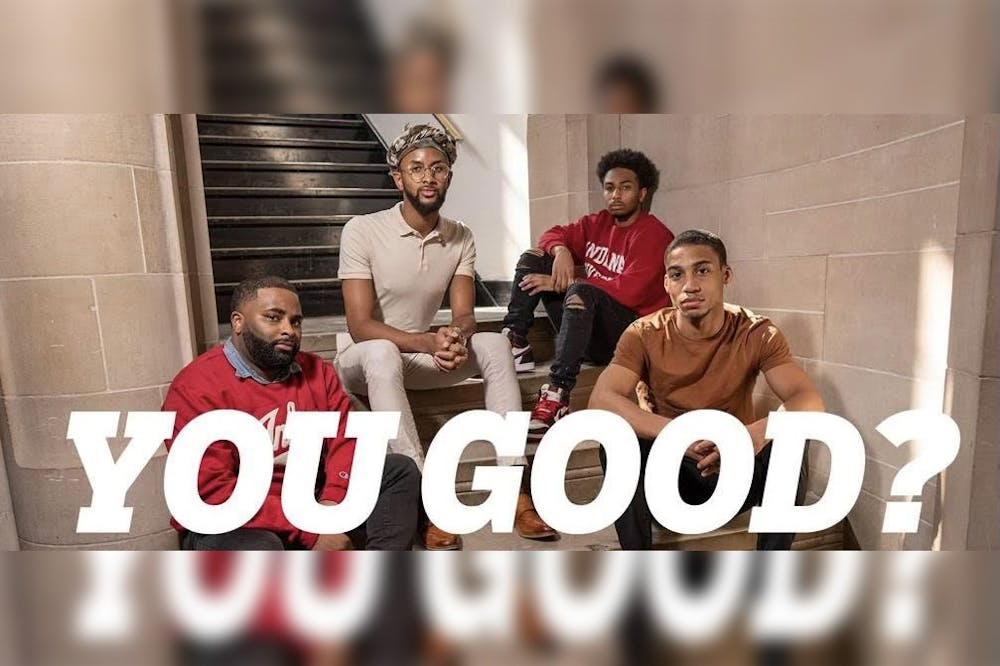Now more than ever, the Black community needs to be intentional about caring for our mental health.
At IU, the ‘You Good?’ initiative, created and launched in March by Rory James and Dennis Daniels in partnership with Counseling and Psychological Services, aims to facilitate a conversation regarding mental health with the Black men of IU and Bloomington in a more relaxed environment than formal counseling.
According to “Brother You’re On My Mind,” a partnership between the National Institute on Minority Health and Health Disparities and Omega Psi Phi Fraternity, Inc., Black people are 20% more likely to have serious psychological distress than white people.
This week, former Minneapolis police officer Derek Chauvin, the man who killed Geroge Floyd, was found guilty of murder in court. Around the same time the proceeding was taking place, a police officer in Columbus, Ohio, shot and killed 16-year-old Ma’Khia Bryant. A 20-year-old Black man, Daunte Wright, was also shot and killed by police earlier this month in Brooklyn Center, Minnesota.
With the recent police killings of Black people, effects of the COVID-19 pandemic and stressors of classes and work, the mental health of Black Americans has been under attack. The “You Good?” initiative is trying to help.
“I feel the ‘You Good?’ initiative is imperative to starting the conversations surrounding mental health with Black men,” junior Escarvar Tatum said. “This initiative could spark a bigger movement.”
Joshua Pack, an IU junior involved with ‘You Good?’ encourages people in the Black community to talk through the things they are experiencing, and said he starts with himself.
The initiative was put together as a safe space for Black men to come and discuss their real lives among like-minded peers who experience similar things, Pack said, especially while attending a predominantly white institution.
“A lot of African American males, they just push through a lot of they mental health stuff,” Pack said. “Mental health is one of those things that people are actually scared to talk about because they don’t know if somebody else is going through that same thing that they’re going through.”
Tatum said he has not had many, if any, conversations about mental health with other members of the Black community, though he has family members with mental illnesses.
An article by Mental Health America references a study about the attitudes of Black people toward mental and psychological issues. It shows that Black and African American men are particularly concerned about the stigma around the issue.
“The whole ‘conversations about mental health with other Black men’ is still, I feel like, is really taboo, so I have never engaged in them. I feel like a lot of times, as men, we lie,” Tatum said. “We say ‘yeah, everything’s fine’ or ‘I’ll be cool’. So even if something is drastically going on, I kinda truly would never know just because that’s so taboo in the Black community.”
Pack explained many Black students, outside of classes in the Department of African American and African Diaspora Studies , are often the only Black person, or only BIPOC person, in the majority of their classes.
“To have this initiative out there, it’s just a bigger outreach for everybody to come together and make, ultimately, the Black community of IU’s campus closer together.”
Additionally, many Black students haven’t experienced having a Black teacher or mentor, so having Black adult mentor figures involved in the initiative provides an added layer of connection and value.
Pack encourages Black men to seek out these kinds of connections with each other.
“One thing I want people on campus to understand, African American males to understand, there are people like them on campus that have the same likemindedness as them,” Pack said. “There are people that want to talk to them and want to create a safe space for people to talk about different things that have to do with mental health, what do we face in society, and also what do we face in the classroom. All those different things that happen on campus and outside of campus. those are things we talk about in the ‘You Good?’ initiative.”
The next ‘You Good?’ meeting is scheduled for 4-5 p.m. Tuesday, April 27, on Zoom.
To those who may have reservations about going to ‘You Good?’ meetings or opening up about mental health in general, Tatum said to just try it once, and recommended “All About Love,” a book by Bell Hooks.
“Just go, it’s not gon’ hurt you. You never have to go again, but to at least say, hey, I did it,” Tatum said. “Also, just because it didn’t work for you, doesn’t mean it couldn’t work for one of your friends.”
If you are experiencing mental health concerns, please use this resource from the Anxiety and Depression Association of America and reach out to a mental health professional.






